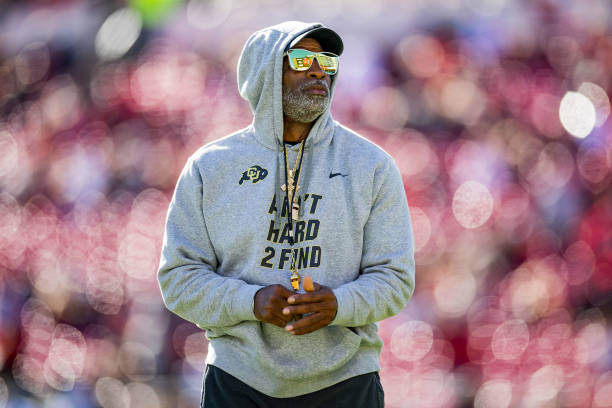
Getty
(Photo by John E. Moore III/Getty Images)

Getty
(Photo by John E. Moore III/Getty Images)
College football’s opening weekend delivered drama in Boulder, but not the kind Colorado fans were hoping for. Deion Sanders’ highly anticipated 2025 opener ended in heartbreak, falling 27-20 to Georgia Tech in a game that had all the makings of a statement victory. What should have been a celebration of the post-Travis Hunter era instead became a painful lesson in how quickly momentum can shift when you’re trailing with just over a minute left on the clock.
Watch What’s Trending Now!
The Yellow Jackets’ Haynes King delivered a dagger that will haunt Folsom Field for weeks to come. A spectacular 45-yard touchdown scamper with 1:07 remaining that flipped the script entirely. Colorado found themselves in a familiar position, needing to drive the length of the field with time ticking away. Deion Sanders’ squad had two precious timeouts in their back pocket and just enough time to potentially force overtime. Instead, what unfolded in those final 67 seconds has become the talk of college football, and not for the reasons Deion Sanders would prefer. The Buffs’ comeback attempt fizzled into a desperate Hail Mary that was swatted down by a swarm of Georgia Tech defenders.
The aftermath brought sharp criticism from ESPN’s Scott Van Pelt, who didn’t mince words about Colorado’s final drive. “Colorado had among the worst two-minute drills I’ve ever witnessed,” Van Pelt said on ESPN. “Not one, two timeouts. They end the game with two timeouts. I believe they ran five plays total. It was just horrendous what they did after.” The numbers tell an even more damning story. Colorado managed to run just six plays while burning nearly 40 seconds on two incomplete passes, watching precious time evaporate when every second mattered most.
ADVERTISEMENT

ADVERTISEMENT
Van Pelt’s criticism wasn’t unfounded when you break down the clock management fundamentals. With 50 seconds left and facing 2nd-and-12 from their own 23-yard line, Kaidon Salter found Hykeem Williams for 11 yards, just one yard short of a first down. Here’s where the wheels came off. Instead of immediately calling a timeout to preserve precious seconds, Colorado let the clock run. They didn’t snap the ball again until 28 seconds remained, essentially gifting Georgia Tech nearly half a minute. ESPN’s Dusty Dvoracek, who called the game, reinforced Van Pelt’s assessment: “Every second is so precious in that scenario, and you got two timeouts in your back pocket. The last thing you ever want to do in a situation like this is end the game with multiple timeouts.”
This wasn’t just a case of rookie mistakes. It was a fundamental misunderstanding of late-game situational football that could define how Colorado is perceived moving forward. Deion Sanders’ post-game explanation only added fuel to the fire, showing a concerning disconnect from basic clock management principles. When you’re trailing by seven with barely a minute left, timeouts become your most valuable currency, not something to hoard for a rainy day.
ADVERTISEMENT
Coach Prime’s puzzling defense falls flat
Sanders’ post-game explanation only deepened the confusion surrounding his timeout strategy, revealing a concerning disconnect between perception and reality. “I think we got out of bounds a couple times, so we didn’t have to take [the timeouts]. So, that’s what transpired,” Sanders explained to reporters. But this rationale crumbled under scrutiny. Colorado’s opening play resulted in a 2-yard loss with the runner tackled inbounds, yet Sanders still refused to call a timeout, watching 22 precious seconds tick away before the next snap. His claim about getting out of bounds “on both sidelines” simply didn’t align with what viewers witnessed, making his defense appear more like wishful thinking than tactical reasoning.
The most damning aspect of Sanders’ explanation came when he doubled down on his decision to “preserve” timeouts for when they were “truly needed.” “We were really trying to conserve them for when they were truly needed,” Sanders stated. “I don’t want to finish with timeouts left; they don’t benefit me. However, it’s crucial to be strategic.” This logic defied basic football fundamentals. If trailing by seven with 67 seconds left isn’t the moment when timeouts are “truly needed,” then when exactly would they be? His assertion that he didn’t want to finish with unused timeouts rang hollow, considering that’s exactly what happened, undermining his own strategic justification.
ADVERTISEMENT
Perhaps most troubling was Sanders’ attempt to rationalize the 11-yard completion to Hykeem Williams that left Colorado just short of a first down. “We only needed one yard, so if we get the first down, the clock stops. It didn’t seem logical to use a timeout then,” he explained. This reasoning exposed a fundamental misunderstanding. Even with a potential first down, using a timeout would have preserved maximum time for additional plays rather than gambling on converting in one attempt. Sanders’ explanations showed exactly why his clock management drew such withering criticism from across the college football landscape.
Top Stories
Greg Biffle’s House Burglary Suspect Identified After Officials Release Security Camera Footage – Report

Scottie Scheffler Injures Fan in the Head at American Express as Painful Moment Is Caught on Camera

‘Hideous’: Jason Day Sparks Outrage With Outfit Choice at PGA Tour Season Debut

Brooke Henderson Ends 10-Year Caddie Partnership With Sister After Major Personal Announcement

Indiana Fever Makes WNBA Announcement on Caitlin Clark’s 24th Birthday

Josh Allen’s Strong Stance on Sean McDermott’s Exit Revealed After Owner Shared Bills QB’s Role in HC’s Firing

ADVERTISEMENT
ADVERTISEMENT
ADVERTISEMENT



